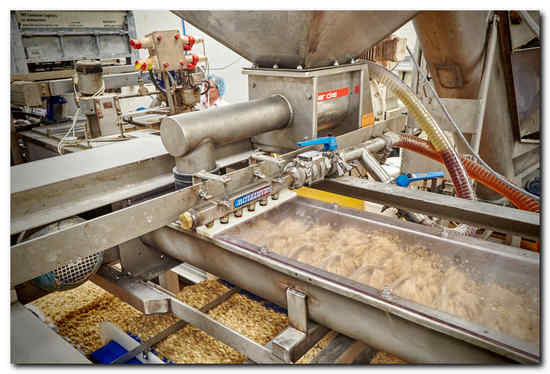Displaying items by tag: mixing
MasoSine pumps provide granola ingredient measurement at S Moores
A company famed for its manufacture of traditional biscuits, is using three MasoSine SPS200 pumps from Watson-Marlow Fluid Technology Group to help it produce up to 80 tonnes of granola a week. Importantly, the introduction of ingredients into the blending and mixing process is controlled precisely by counting the revolutions of the pump shaft, a shrewd strategy that has negated investment in a dedicated weighing assembly.

S Moores, a family-owned (fifth generation) business based in Dorset, has been at its current factory near Bridport for over 10 years. Until recently, the company used batch-manufacturing techniques for its granola requirements. Here, S Moores had to weigh ingredients such as vegetable oil and golden syrup into a mixer. However, to help improve productivity, the company decided to replace this set up with continuous mixer technology.
Measured production
“The MasoSine SPS200 that was previously deployed on our batch mixer was transferred to the new continuous mixer with the addition of a speed control for accurate blending,” explains Company Partner David Winship. “This allowed us to dose the warm oil-syrup blend into the mixer at the right rate. In effect, every revolution of the pump produces an identical volume of material. Hence, by controlling the speed, we can inject the precise amount of blend required.”
In 2015, S Moores set about acquiring two further MasoSine SPS200 pumps to serve a pair of heated (50°C) vessels, one for syrup and one for oil. Both pumps are operated on a count down timer which, in conjunction with the speed control, gives the precise volumes required.
“For example, if we need 30 litres of oil for a particular granola recipe, then we know that 170 revolutions of the pump shaft will deliver that quantity, and similarly with the syrup,” says Mr Winship. “The oil and syrup travel a distance of 8 metres [including 2 metres of vertical lift] into a blender, which is then activated to mix a blend that is dispensed using our original MasoSine pump into the continuous mixer at a given rate. This means that we now have a fully automated process without any of the buckets, weighing scales and ladders associated with manual operations.”

The mixture of vegetable oil and golden syrup at S Moores produces a substance with a viscosity in the region of 1000-2000 Cp. This blend is pumped into the continuous mixer at around 750 l/h, or 50 litres every 2 minutes.
The sinusoidal rotor design of MasoSine SPS pumps delivers a low shear, gentle pumping action that safely transfers products without risk of degradation. SPS pumps are suitable for food, sanitary and industrial applications up to 15 bar pressure, at flows up to 99,000 l/hr. Products with viscosities from 1 cP to 8 million cP can be transferred with suction up to 0.85 bar.
Sine pumps preferred
“Originally we looked at progressive cavity pumps, but they have wear parts and are a bit of a nuisance to clean,” says Mr Winship. “In contrast, with the MasoSine SPS200 pumps, we simply take the front cover plate off and pressure wash, which we do once a week as part of our quality and hygiene control procedures. Other than that, the pumps are utilised heavily every day across a two-shift operation. Our original blend pump has been in place for five years and I think we’ve replaced the plastic gate once – and only as a preventative measure.”
Ultimately, the automated pumping operations are helping S Moores output between 70 and 80 tonnes of granola every week.
Mr Winship concludes: “I’m not sure how many other manufacturers are deploying MasoSine pumps in this manner, but to us it seemed that using them as a measuring tool was an obvious way to negate the need for a dedicated weighing assembly – and it works very well.”
